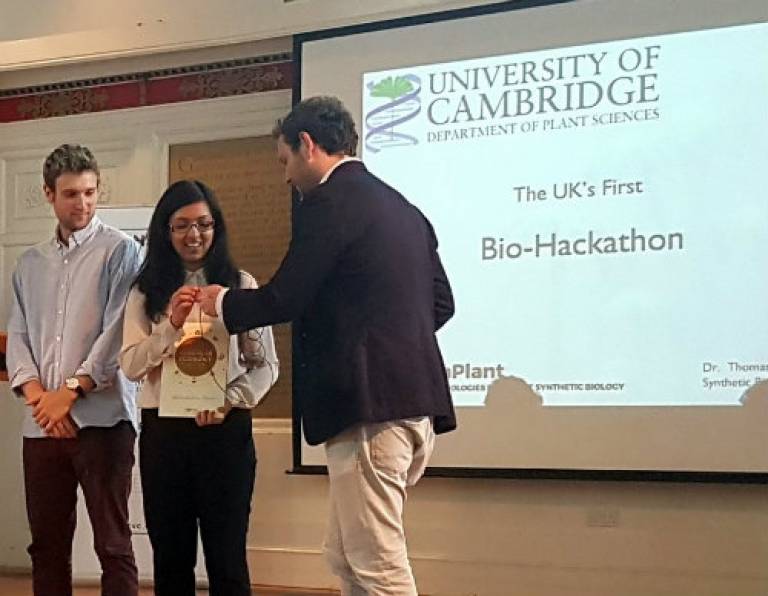UCL Biochemcial Engineering students win first UK Bio-Hackathon
14 July 2016
The UCL student team competing in the 2016 International Genetically Engineered Machines (iGEM) Synthetic Biology competition has enjoyed early success this year, with members of the team winning the UK's first 'Bio-Hackathon' event hosted by Cambridge University.

The Bio-Hackathon event asked 50 participants to tackle global challenges using synthetic biology. Hana Janebdar and Pablo Lubroth are students on the MSc Biochemial Engineering programme at UCL Biochemical Engineering Department and members of the 2016 UCL iGEM team. Their winning Bio-Hackathon project was to develop software for so-called 'cloud experimentation' to enable synthetic biologists to remotely design, exchange and create synthetic gene constructs. Their projected was selected as the winner by investors, VCs, start-up founders and academics at the 2016 Technology Ventures Conference, Cambridge.
Great early win
Reflecting on their success, Hana Janebdar commented "This is a great early win for the UCL iGEM team which we hope to use as a platform for more succes at the iGEM finals event in October". Pablo Lubroth, who is also Treasurer and Sponsorship Director of UCL Entrepreneurs Society, said, "We are thrilled to win the first UK Bio-Hackathon. It's great that our MSc programme and UCL Biochemical Engineering supported our participation and recognises the key role of entrepreneurship and synthetic biology in the modern biotech industry".
iGEM is an annual student synthetic biology competition which started at the Massachusetts Institute of Technology (MIT) in 2004. Since its inception iGEM has grown from five participating US universities into an international competition spanning over 300 universities from across the world.
UCL Biochemical Engineering has hosted UCL iGEM teams since 2009, harnessing the department's position as a centre of excellence in industrial application of synthetic biology. This year the UCL Faculty of Engineering Science and Department of Biochemical Engineering is again supporting UCL participation in iGEM.
Dr Darren N. Nesbeth, UCL Biochemical Engineering, coordinates the team's efforts and commented, "Two spinout companies have so far been founded from UCL iGEM teams and we expect more to follow. UCL iGEM students continue to thrive due to the excellent support my colleagues provide here at UCL Biochemical Engineering and we are elated at the early success of this year's team."
Dr Darren Nesbeth, UCL Department of Biochemical Engineering
 Close
Close

